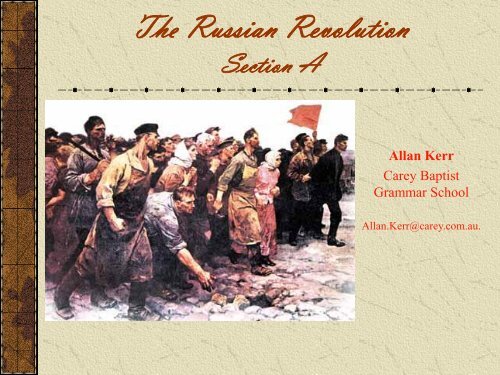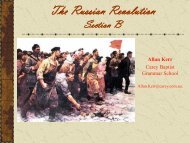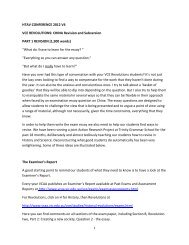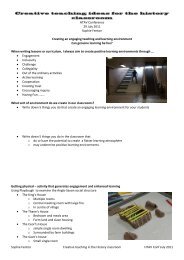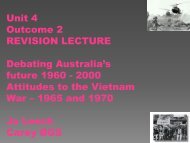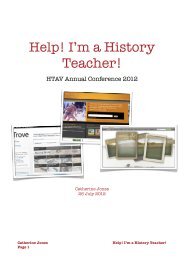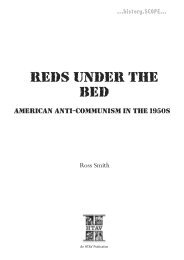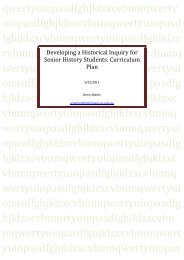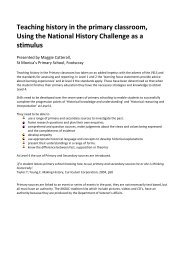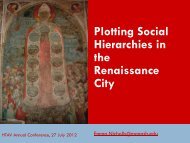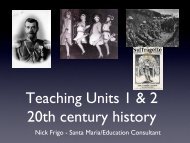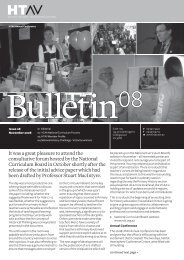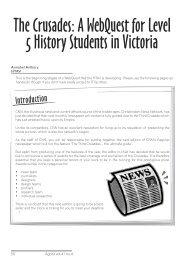Section A - HTAV
Section A - HTAV
Section A - HTAV
You also want an ePaper? Increase the reach of your titles
YUMPU automatically turns print PDFs into web optimized ePapers that Google loves.
The Russian Revolution<br />
<strong>Section</strong> A<br />
Allan Kerr<br />
Carey Baptist<br />
Grammar School<br />
Allan.Kerr@carey.com.au.
<strong>Section</strong> A<br />
How it will be assessed on the Exam<br />
<strong>Section</strong> A – Part 1<br />
Two Extended Questions’ – 2 x 10<br />
marks –Approx. 25 lines so aim for 250<br />
words<br />
This is a test of (primarily) your<br />
knowledge. You don’t have to back up<br />
your points with quotes or lengthy<br />
pieces of evidence. You do have to be<br />
specific – cite definites.<br />
The examiners do not want dot points<br />
but paragraph responses containing<br />
“points arranged as a series of flow-on<br />
sentences”.<br />
They don’t want to see historians’<br />
opinions.<br />
Remember.<br />
The questions will<br />
come from the four<br />
bullet points in the<br />
Study Design.
The Bullet Points
KEY events of the Russian<br />
Revolution<br />
1. 1905 ‘Revolution’<br />
i. Russo-Japanese War 8/2/04-5/9/05<br />
ii. Bloody Sunday – 9 January 1905<br />
iii. Potemkin Mutiny – 14 June<br />
iv. The General Strike – 16 th October<br />
v. October Manifesto – 17 th October<br />
2. Outcome of 1905<br />
i. Establishment and Dismissal of the<br />
ii.<br />
iii.<br />
First Duma (April-July 1906)<br />
Four days before – reissuing of<br />
Fundamental Laws<br />
Witte replaced by Stolypin<br />
3. Repression and Reform by<br />
Stolypin – 18/9/1911<br />
4. 300 th anniversary – 6/3/1913
KEY events of the Russian<br />
Revolution<br />
1. WW1<br />
i. 1/8/1914<br />
ii. Battle of Tannenberg – August<br />
iii. Battle of Masurian Lakes –<br />
September<br />
iv. Nicholas’ decision to take control of<br />
the Army – August 21, 1915<br />
2. Feb Revolution & Nicholas’<br />
abdication 2 March 1917<br />
3. October Revolution, 1917.
Five KEY factors of the Russian<br />
Revolution<br />
1. Industrialisation<br />
2. Political Unrest<br />
3. Impact of War<br />
4. Weak leadership<br />
5. Awareness of Inequality
Causes of Tensions and Conflicts…<br />
1. Rising expectations eg proliferation of antitsarist<br />
groups/organizations;<br />
2. Failed attempts at economic reform – Witte and<br />
Stolypin;<br />
3. Failed attempts at political reform – Dumas;<br />
4. Fluctuations in economic activity caused by<br />
industrialisation versus agronomy;<br />
5. Economic inequality or lack of political voice –<br />
Bloody Sunday;<br />
6. The social and economic impact of World War I<br />
on Tsarist Russia.
The ideas and ideologies utilised in<br />
the Revolutionary struggle<br />
1. Karl Marx and Communism<br />
2. Nikolai Chernyshevsky<br />
3. V.I. Lenin & Leninism<br />
4. Julius Martov & Menshevism<br />
5. Constitutional Govt.<br />
6. Democracy<br />
7. Anti-Tsarism
The role of revolutionary individuals<br />
and groups in bringing about change<br />
Top Five<br />
1. Nicholas II<br />
2. Kerensky<br />
3. Bolsheviks<br />
4. Trotsky<br />
5. Lenin
The role of revolutionary individuals<br />
and groups in bringing about change<br />
Others<br />
1. Rasputin<br />
2. Stolypin<br />
3. Dumas<br />
4. Rodzianko<br />
5. SDLP<br />
6. Mensheviks<br />
7. S.R.’s<br />
8. Kornilov<br />
9. Stalin
Past Questions<br />
2005 2006 2007 2008 2009 2010 2011<br />
Lenin's ideas<br />
(Leader/Idea)<br />
Abdication<br />
of Nicholas II<br />
(Event)<br />
Response to<br />
Bloody<br />
Sunday<br />
(Event)<br />
Provisional<br />
Govt's<br />
responses<br />
(Leaders/Group)<br />
WW1<br />
(Event)<br />
Lenin’s<br />
Policies<br />
(Leader)<br />
Tsar's measures<br />
in implementing<br />
October Manifesto<br />
(Event/Leader)<br />
Formation of PG<br />
(Event/Group)<br />
Russo-Japanese<br />
War<br />
(Event)<br />
April Theses<br />
(Event/Idea)<br />
World War One<br />
(Event)<br />
Role of Kornilov<br />
(Event/Leader)<br />
State Dumas<br />
Dual Authority
Tips and Advice<br />
Tips<br />
‣ Bloody Sunday/1905<br />
Revolution<br />
‣ Ideas – Marxism<br />
‣ Kerensky<br />
Advice<br />
‣ Fill the space<br />
‣ Lots of dates/facts<br />
‣ ATBQ
<strong>Section</strong> A Part 2<br />
November 1917 – Death of Lenin
<strong>Section</strong> A<br />
How it will be assessed on the Exam<br />
<strong>Section</strong> A – Part 2<br />
One question with sub parts that will examine Area<br />
of Study 2 - Creating a new society and will<br />
consist of an analysis of a document, commentary,<br />
visual representation or interpretation.<br />
Generally – 4 questions – 2 x2 marks, 1 x 6 marks,<br />
1 x 10 marks.<br />
2x4 lines, 1x17 & 1x27<br />
Approach – Comprehension, Context and Function
Bullet Points<br />
The contribution of individuals and groups to the<br />
Creation of a New Society.<br />
The causes of difficulties or crises faced by the<br />
revolutionary groups or governments as a new state<br />
was consolidated.<br />
The response of the key revolutionary groups,<br />
governments or parties to the difficulties they<br />
encountered as the new state was consolidated.<br />
The compromise of revolutionary ideals.<br />
The changes and continuities that the revolution<br />
brought about in the structure of government, the<br />
organisation of society, and its values, and the<br />
distribution of wealth and conditions of everyday<br />
life.
<strong>Section</strong> A<br />
How it will be assessed on the Exam<br />
<strong>Section</strong> A – Part 2<br />
This is a section based on your ability to<br />
comprehend, interpret and evaluate so you<br />
will be required to display your contextual<br />
knowledge as well as present responses that<br />
satisfy the questions posed. Be precise in your<br />
responses to the first two questions, display<br />
your contextual knowledge in the third<br />
question by citing at least three absolute facts<br />
about the event or action that the commentary<br />
is about. Finally, question the usefulness of<br />
the commentary or interpretation.
Example<br />
Extract from Richard Pipes, Communism: A History of the Intellectual and<br />
Political Movement, p. 42-3:<br />
Except for retaining their grip on power, the Bolsheviks experienced setbacks in nearly<br />
all of their endeavours. Life turned out to be very different from theory. But they would<br />
not admit they were wrong: whenever things did not turn out as desired, they did not<br />
compromise but instead intensified the violence. To admit to being wrong would<br />
threaten to unravel the whole theoretical foundation of their regime since it claimed to<br />
be scientifically correct in all parts.<br />
Among many of Lenin's disappointments was the emergence of a huge, self-serving and<br />
uncontrollable bureaucracy. According to Marxist doctrine, the state is nothing more<br />
than the servant of the class that owns the means of production; it has no interests of<br />
its own. This belief showed remarkable ignorance of political history since there exists<br />
a great deal of evidence that, from the time of the pharaohs, state officials looked after<br />
themselves...
Example<br />
Extract from Richard Pipes, Communism: A History of the Intellectual and<br />
Political Movement, p. 42-3:<br />
4 questions:<br />
‣ 2 straight forward comprehension questions<br />
‣ 1 contextual<br />
‣ 1 question on ‘usefulness’ or function of the author<br />
‣ To what extent is this extract useful in understanding the nature of Bolshevik rule<br />
during the period, 1917-1921?
Example<br />
Extract from Richard Pipes, Communism: A History of the Intellectual and<br />
Political Movement, p. 42-3:<br />
Except for retaining their grip on power, the Bolsheviks experienced setbacks in nearly<br />
all of their endeavours. Life turned out to be very different from theory. But they would<br />
not admit they were wrong: whenever things did not turn out as desired, they did not<br />
compromise but instead intensified the violence. To admit to being wrong would<br />
threaten to unravel the whole theoretical foundation of their regime since it claimed to<br />
be scientifically correct in all parts.<br />
Among many of Lenin's disappointments was the emergence of a huge, self-serving and<br />
uncontrollable bureaucracy. According to Marxist doctrine, the state is nothing more<br />
than the servant of the class that owns the means of production; it has no interests of<br />
its own. This belief showed remarkable ignorance of political history since there exists<br />
a great deal of evidence that, from the time of the pharaohs, state officials looked after<br />
themselves...
Suggested Formula<br />
Identify 2 features from the<br />
document/image/commentary that betrays its<br />
bias or usefulness<br />
Compare to a similar view and quote<br />
Contrast with an opposing view and quote<br />
Conclude with another view and quote
Historians<br />
View ‘School’ Historians<br />
The revolution was not inevitable. Lead by individuals who<br />
manipulated the ignorance of others - a revolution from<br />
ABOVE. Believe in human rights and the fundamental<br />
freedom of the individual with an inclination towards anticommunism.<br />
Argue that there must be more to Bolshevik success than the<br />
individuals. The revolution must have had reasonable support<br />
from the peasantry and proletariat. Focus tends to be on social<br />
history and the role of ordinary people. Revolution from<br />
BELOW<br />
The revolution was part of the historical process envisioned by<br />
Marx. It was a people’s revolution (from below) - driven by<br />
the peasantry and the proletariat.<br />
Schapiro,<br />
Daniels,<br />
Conquest,<br />
Pipes,<br />
Chamberlain<br />
Fitzpatrick,<br />
Rabinowich,<br />
Service,<br />
Nove, Smith<br />
Pospelov,<br />
Golub,<br />
Alexandrov,<br />
Obichkin,<br />
CPSU
AoS 2 – Russian<br />
Images
Possiblities<br />
Historians/<br />
Commentators<br />
Figes<br />
Smith<br />
Conquest<br />
Lenin<br />
Trotsky<br />
Fitzpatrick<br />
Pipes<br />
CPSU<br />
Topics<br />
Role of Lenin or Trotsky<br />
Crisis – Civil War<br />
Crisis – War Communism<br />
Compromise - NEP<br />
Compromise - Kronstadt<br />
Bolshevik force<br />
Lenin and Civil War<br />
Change or Continuities
Past Questions<br />
2005 2006 2007 2008 2009 2010 2011<br />
Pipes and<br />
Civil War.<br />
Role of<br />
Civil War<br />
DOCUME<br />
NT<br />
Kronstadt<br />
demands.<br />
Nature of<br />
Reforms<br />
DOCUM<br />
ENT<br />
Lenin<br />
defends<br />
Bolshevik<br />
rule<br />
Figes on<br />
War<br />
Communi<br />
sm<br />
DOCUM<br />
ENT<br />
Lenin<br />
introduces<br />
NEP<br />
DOCUM<br />
ENT<br />
Speech by<br />
Lenin in<br />
Const<br />
Ass.<br />
IMAGE<br />
Cossack<br />
in Civil<br />
War
Tips and Advice<br />
Possibly due for an historians’<br />
opinion…<br />
Read the questions before you read the<br />
extract so that you know what you are<br />
looking for.<br />
ATQ


